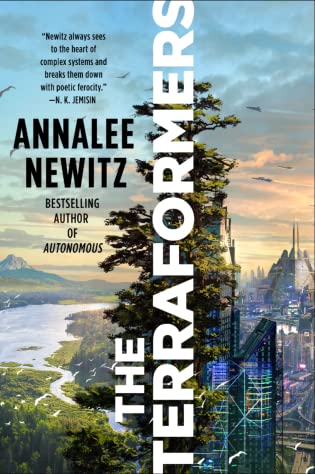 The Terraformers by Annalee Newitz
The Terraformers by Annalee Newitz Format: eARC
Source: supplied by publisher via Edelweiss
Formats available: hardcover, paperback, ebook, audiobook
Genres: hopepunk, science fiction
Pages: 352
Published by Tor Books on January 31, 2023
Purchasing Info: Author's Website, Publisher's Website, Amazon, Barnes & Noble, Kobo, Bookshop.org, Better World Books
Goodreads
The Terraformers is an equally heart-warming and thought-provoking vision of the future for fans of Becky Chambers, Kim Stanley Robinson, and Martha Wells.
Destry is a top network analyst with the Environmental Rescue Team, an ancient organization devoted to preventing ecosystem collapse. On the planet Sask-E, her mission is to terraform an Earthlike world, with the help of her taciturn moose, Whistle. But then she discovers a city that isn't supposed to exist, hidden inside a massive volcano. Torn between loyalty to the ERT and the truth of the planet's history, Destry makes a decision that echoes down the generations.
Centuries later, Destry's protege, Misha, is building a planetwide transit system when his worldview is turned upside-down by Sulfur, a brilliant engineer from the volcano city. Together, they uncover a dark secret about the real estate company that's buying up huge swaths of the planet―a secret that could destroy the lives of everyone who isn't Homo sapiens. Working with a team of robots, naked mole rats, and a very angry cyborg cow, they quietly sow seeds of subversion. But when they're threatened with violent diaspora, Misha and Sulfur's very unusual child faces a stark choice: deploy a planet-altering weapon, or watch their people lose everything they've built on Sask-E.
My Review:
The Terraformers – the story – is a story about legacy, every bit as much as the planet Sask-E (elided over the centuries to Sasky) is the living, breathing legacy of the terraformers who helped to make it.
But terraforming as a process is long and expensive, so even though the action of the story takes place over centuries, that’s just a drop in the bucket of the planet’s own time. But more than long enough for the reader to fall in love with the place and its people.
Because of the length and expense of that terraforming process, along with what seems to be the tendency of governments everywhere and everywhen to believe – or at least pretend to believe – that private enterprises will do a better, more efficient or at least less obviously costly job of doing things that should be the province of government, Sask-E was developed, owned and operated by the Verdance Corporation.
And thereby, quite literally, hangs our tale. And eventually theirs.
The underlying ethos of terraforming is itself a legacy, the legacy of the Environmental Rescue Teams were created to clean up the vast ecological mess that Earth became during the anthropocene era – which is right now, BTW.
When we first visit Sask-E its terraforming phase is just about at an end, and its commercial exploitation phase is just about to begin. Network analyst Destry, one of the members of Sask-E’s corporate-owned Environmental Rescue Team – which is every bit the oxymoron one might think it would be – discovers that at least one of the things she’s always been taught isn’t remotely true.
There are already people living on Sask-E, the direct descendants of the early terraforming teams who were supposed to have all died off hundreds of years ago when the planetary atmosphere became too oxygen-rich for their engineered biology. They didn’t die, they adapted – as humans do.
Verdance wants to eliminate them. Destry wants to make sure they get to remain right where they are. The compromise she makes, the clandestine treaty she brokers between the warring factions, is definitely a case of lesser of evils – one for which Destry pays the highest price.
But in the end, that compromise – along with Destry’s adopted grandchild, an intergalactic reporter in the shape of a genetically engineered cat and a whole host of creatures great and small, mechanical and biological, humans both H. sapiens and H. diversus, reach out to grasp the freedom they should have had all along.
The corporate bigwigs would say that it’s still all Destry’s fault.
Escape Rating A+: This is going to be one of those “all the thoughts” kind of reviews because WOW this thing wrapped me up, took me away and made me think – all at the same time.
At first, there’s the adventure aspect of the whole thing. Destry and her friend Whistle (an intelligent, genetically engineered moose) have this whole planet to explore and they love every inch of it. And there’s a lot of hope to be had even in Destry’s early part of the story. For one thing, it seems that humanity did manage to rescue this planet before we killed it completely along with ourselves. That’s hope right there.
There’s also plenty to love in the way that her position and her work integrates the contributions of both humans and non-humans, and that anyone or anything can be considered a person and a citizen.
And that’s where the dark underbelly gets exposed. Not just that we exported megacorporations and their endless greed along with humanity, but rather that the whole nature of the work and the enterprise has brought back slavery on a galactic scale. Destry doesn’t just work for Verdance, it created her and it owns her. And everyone else working on Sask-E.
Just as Under Fortunate Stars recalls the Star Trek Next Gen episode “Yesterday’s Enterprise”, The Terraformers brings to mind “The Measure of a Man” in all of its shining possibilities AND its potential horrors. Everyone on Sask-E is genetically engineered and created in a lab, just as Data was – whether they are biological like Destry, mechanical like the many bots or a mixture of the two.
And the horror of all of that is a dubious gift that keeps on giving throughout the story. The underlying tension of the whole thing is that humanity has a future that has so many wonderful possibilities in it. At the same time, it’s more than a bit of a “we have met the enemy and he is us” story because we bring all our shit with us into the future.
(Or drag it back into the past. Verdance’s advertised goals for Sask-E were to recreate the ecology of Earth’s supposedly pristine Pleistocene era. The disconnect between the propaganda and the company’s actual intentions brought back to mind Julian May’s Saga of Pliocene Exile which had not dissimilar goals leading to surprisingly similar results. In other words, a world, whether past, present or future, is only pristine until you introduce humanity into the situation and then, well, shit literally happens.)
The Terraformers moves forward from Destry’s discovery that both her past and the past on Sask-E are both a lie. But it doesn’t end there. We move to a new era of exploration and exploitation when we follow Destry’s adopted son as he becomes the recipient of all the corporate ire that can no longer be visited on Destry because she’s dead and gone. And through his eyes we see just how far those rapacious corporations are willing to go in order to create the kind of thoughtless consumers of both goods and propaganda that will serve them best.
But the story ends in hope with a story of revolution and courage that may remind more than a few readers of Robert A. Heinlein’s classic, The Moon is a Harsh Mistress, as what the corporations want is very much not what they get when people – no matter how broadly “people” is defined – manage to reach for their own destinies in spite of all the roadblocks dropped in their way.
If you’re looking for the kind of hopepunk SF featured in The Psalm for the Wild-Built by Becky Chambers – traveling down a different road but with equally compelling characters – mixed with more than a touch of the corporate skullduggery of Martha Wells’ Murderbot, The Terraformers is a thought-provoking delight from beginning to end.

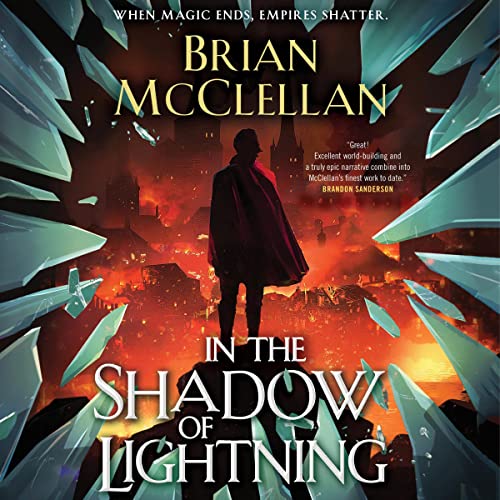 In the Shadow of Lightning (Glass Immortals, #1) by
In the Shadow of Lightning (Glass Immortals, #1) by 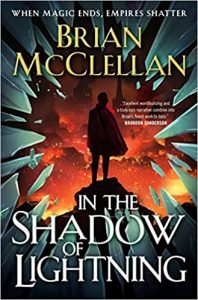 Escape Rating A+: “Glassdamn.” It rolls easily through the mind, or trippingly off the tongue, as though it’s an epithet that we’ve always used – or at least could have if we’d had a mind to. And glassdamnit but this is a terrific story.
Escape Rating A+: “Glassdamn.” It rolls easily through the mind, or trippingly off the tongue, as though it’s an epithet that we’ve always used – or at least could have if we’d had a mind to. And glassdamnit but this is a terrific story.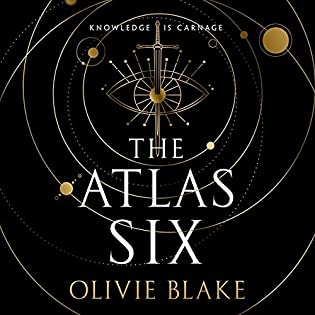 The Atlas Six (The Atlas, #1) by
The Atlas Six (The Atlas, #1) by 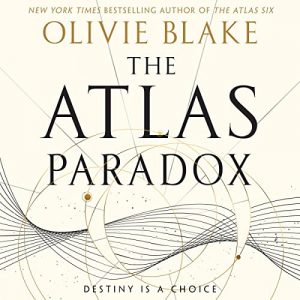 Which admittedly does ramp up the tension VERY dramatically for the second book in the series,
Which admittedly does ramp up the tension VERY dramatically for the second book in the series, 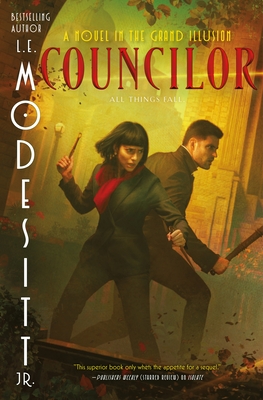 Councilor (The Grand Illusion #2) by
Councilor (The Grand Illusion #2) by  Escape Rating A: Just as with the first book in the series,
Escape Rating A: Just as with the first book in the series, 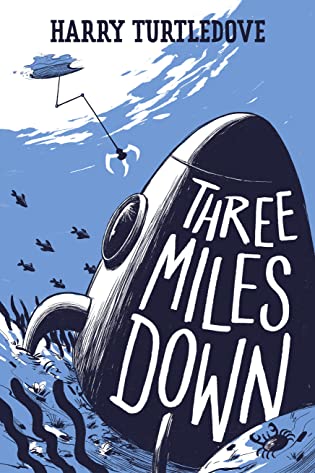 Three Miles Down: A Novel of First Contact in the Tumultuous 1970s by
Three Miles Down: A Novel of First Contact in the Tumultuous 1970s by 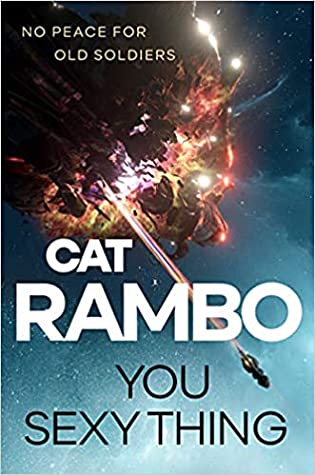 You Sexy Thing (Disco Space Opera #1) by
You Sexy Thing (Disco Space Opera #1) by  Last Exit by
Last Exit by 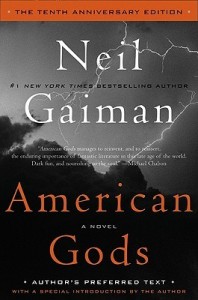 Escape Rating A-: In the end, Last Exit is awesome. But it takes one hell of a long and painful journey to reach that end. Because it starts with all of them not just apart, but in their own separate ways, falling apart. And it ends with all of their demons coming home to roost – and nearly destroying them – as they relive the past and do their damndest to push through to either some kind of future – or some kind of sacrifice to balance out the one they already made when they lost Sal.
Escape Rating A-: In the end, Last Exit is awesome. But it takes one hell of a long and painful journey to reach that end. Because it starts with all of them not just apart, but in their own separate ways, falling apart. And it ends with all of their demons coming home to roost – and nearly destroying them – as they relive the past and do their damndest to push through to either some kind of future – or some kind of sacrifice to balance out the one they already made when they lost Sal. Nettle & Bone by
Nettle & Bone by  Which is another way that this is a story about fairness, privilege, and the actual powerlessness that afflicts people in positions of seeming power – at least if those people are female.
Which is another way that this is a story about fairness, privilege, and the actual powerlessness that afflicts people in positions of seeming power – at least if those people are female. Escape Rating A+: I was looking for something by T. Kingfisher AKA Ursula Vernon to review as part of this Blogo-Birthday Celebration Week because so far I’ve loved everything of hers that I’ve read, especially
Escape Rating A+: I was looking for something by T. Kingfisher AKA Ursula Vernon to review as part of this Blogo-Birthday Celebration Week because so far I’ve loved everything of hers that I’ve read, especially 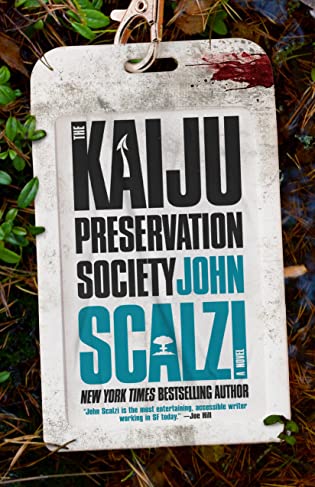 The Kaiju Preservation Society by
The Kaiju Preservation Society by  Escape Rating A-: The Kaiju Preservation Society reads like vintage Scalzi of the
Escape Rating A-: The Kaiju Preservation Society reads like vintage Scalzi of the 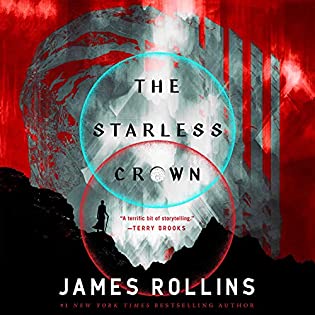 The Starless Crown (Moon Fall, #1) by
The Starless Crown (Moon Fall, #1) by